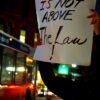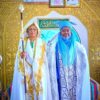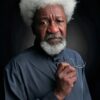Nothing Is Permanent: Why the Outrage Over “Baddo Bus Stop” Misses the Bigger Picture. (Op-ed)
Nothing Is Permanent: Why the Outrage Over “Baddo Bus Stop” Misses the Bigger Picture. (Op-ed)

Op-ed: When Fiction Meets Reality.
Nigeria, Our Homeland, Is Bigger Than Memes and Emojis – By Yetunde Babajide
If there’s one truth about the current turmoil in Nigeria, it’s that some individuals are even willing to lay blame on the Almighty God for allegedly favoring certain groups over others.
But that’s not how life works.
In fact, when viewed from a broader lens, much of the unrest we’re witnessing in Nigeria today arises from how some Nigerians vent their frustrations on social media.
Often, tribal tensions are incited not out of genuine concern—but driven by a thirst for attention, monetization, clickbait, and controversy.
Indeed—the economy may be facing serious challenges, and conditions are difficult in Nigeria.
But using your freedom on social media to turn every national issue into Facebook content is not patriotism. It is opportunism.
Underneath it all lies deception, curated clicks, and a monetization game lurking behind every pixel.
And when the conflict you’ve been fueling finally escalates, you too will not escape its consequences.
In countries where war breaks out, income from social media becomes irrelevant survival becomes the only goal.
People who have traveled, lived, and experienced life beyond Nigeria understand a fundamental truth: existence is not eternal.
Nothing is ever given to man permanently, not even the ability to breathe. If life were permanent, death wouldn’t exist.
As the adage goes, “As it is done in heaven, so it is on earth”—nothing bestowed upon humanity lasts forever.
Those who give you something today may ask you to return it tomorrow—and when they do, you must relinquish it—gracefully.
This very truth is playing out in Lagos today.
Before the bus stop was known as Charlie Boy Bus Stop, it had long been called Pedro Bus Stop.
At the time, the locals—mostly Yoruba—renamed it in honor of Charlie Boy, someone they admired deeply.
There was no tribal conflict. No outrage. Just a pure gesture of appreciation rooted in cultural respect.
Now, the name is changing again. Olamide Baddo, a beloved figure whose music and message resonate with Gen Z and millennials, has been embraced by the same local community.
They say it’s time to honor someone else—someone they also admire.
So, what is fueling the backlash?
Some people are trying to turn it into a tribal issue, conveniently ignoring the fact that it was the same Yoruba community who once named the bus stop after an Igbo man—Charlie Boy.
There was no tribal resistance then. This renaming is not about tribalism—it’s about relevance. It’s about connection.
Names change. Symbols evolve. Generations rise and fall.
Public property belongs to the community—and by law, communities have every right to rename places as they see fit.
If you don’t own it, you cannot contest it. Respecting these decisions is one of the first lessons of democracy.
Yet, as expected, some point to Wole Soyinka’s name being honored in Abia State, asking why it hasn’t been changed. But comparing that to the Lagos situation is misguided.
Soyinka’s recognition wasn’t decorative—it was earned through what he stood for during the Biafra War.
He put his life on the line for what he believed, and the history is well documented. That kind of legacy is not erased—it’s celebrated.
Trying to compare two unrelated things is a distraction, and in an age of unlimited Facebook access, it exposes just how unserious we are about genuine dialogue.
Nothing in this world is everlasting—not even your breath. And the community desires Baddo Bus Stop. Let it be.
In fact, I call on Charlie Boy to rise above the pettiness and Facebook drama—visit that bus stop, take Olamide’s hand, and snap a photo together at the newly renamed location.
This is how we demonstrate unity. This is how we lead.
Because in the end, the unity of our nation and the solidarity of our people surpass everything else.
Let’s face it: when these Facebook-fueled tribal wars spill into real-life violence, not even those who triggered it will benefit from the destruction they began.
Yetunde B reports for Yeyetunde’s Blog.
Image / YBNL Nations





















Leave a Reply